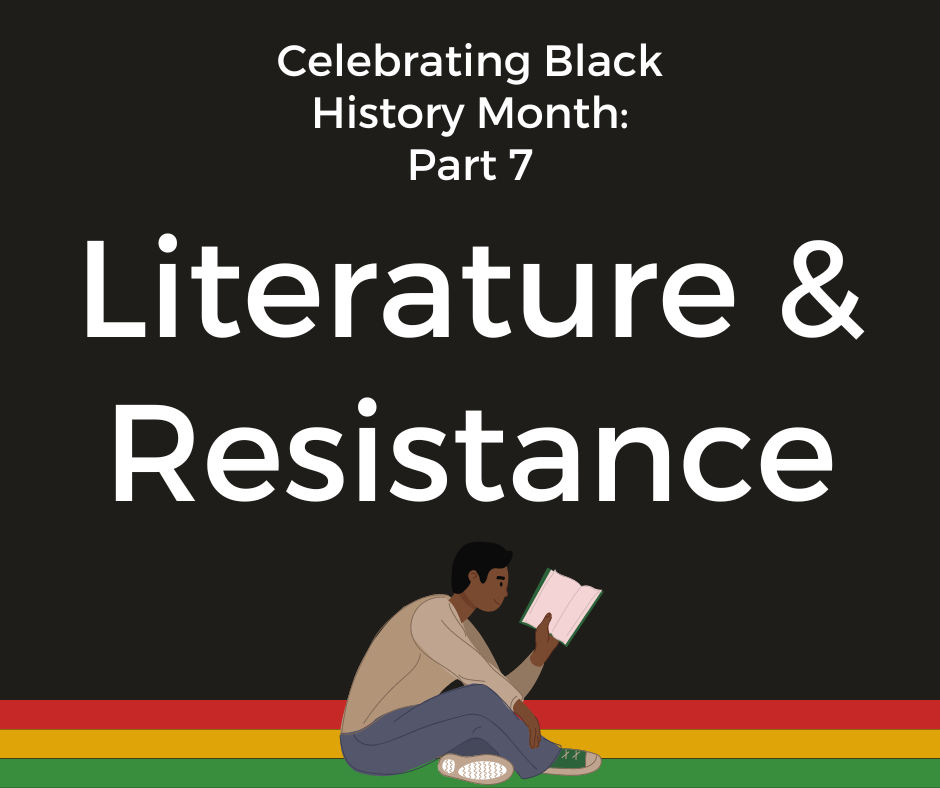Throughout the month of February, we are sharing posts written by Imagine Institute training program assistant Lourdes Flores about Black History Month. This series will follow the long history of Black History Month, Black History in the United States, and how we can all celebrate Black History Month in a way that is supportive, healthy, and, most importantly, empowering.
Influence of Literature
Literature is a fundamental avenue of Black expression in the United States, and one that has been historically suppressed. Pre-dating the United States, reading and writing has often been reserved and limited for powerful groups to maintain control over populations. Even thinking on the Protestant revolution of Europe, a fundamental part of it was spreading the word of the Bible and teaching people to read to allow them to interpret it themselves – the leader of the revolution was previously a Catholic priest and found that the church was outright lying about the scripture and weaponizing it to collect high and frequent tithes from a peasant majority who was already impoverished.
The power of written word has never been unknown, and knowing how to read and write was punishable by death to African Americans during the Antebellum period. Long after the Emancipation Proclamation was signed by Lincoln, barriers to education helped ensure low literacy rates in the Black community – that is, until Black Americans founded their own institutes of learning, crowdfunding and sourcing their own ways and spreading standardized education throughout the community, by and for themselves.
Literature is a treasured art because it is almost the pinnacle of resistance, and the art that has been created by Black Americans is unique, powerful, and expository. Here we visit some books, as well as a vastly unrecognized, but very powerful, resistance movement.
Harlem Writers Guild
This is the oldest organization of African American writers, originally established as the Harlem Writers Club in 1950. It sought to give African American writers a platform to present their art without censoring their experience of being Black in the United States of America.
The Harlem Writers Guild used their social circles and their academic voices towards social change. They had revolutionary meetings in coffee shops in Harlem, supported the Black Panther movement, Malcolm X, liberation movements in Mozambique and Angola, and organized to help dismantle apartheid policies in South Africa with American resources.
They fought against publishers who refused to publish Black artists by creating networks of resistance and going largely unnoticed by oppressive regulatory authorities. It is estimated that the Harlem Writers Guild, through their shared network, published more than 300 literary works.
Legacy: We continue to see book bans on many ‘controversial’ books that speak of the Black experience in America. While the topics that are often covered in Black literature are not “pretty” or “palatable”, by ignoring and suppressing these works, we not only suppress a key form of expression, but we force oppression into obscurity, allowing us to continue to not address key issues.
Banned Books by Black Authors:
- Native Son, Richard Wright (1940)
- The Color Purple, Alice Walker (1982)
- I Know Why the Caged Bird Sings, Maya Angelou (1969)
- Song of Solomon, Tori Morrison (1977)
- New Kid, Jerry Craft (2019)
- Black Boy, Richard Wright (1945)
- Go Tell it on the Mountain, James Baldwin (1953)
- Their Eyes were Watching God, Zora Neale Hurston (1937)
- The New Jim Crow: Mass Incarceration in the Age of Colorblindness, Michelle Alexander (2011)
- Black Birds in the Sky: The Story and Legacy of the 1921 Tulsa Race Massacre, Brandy Colbert (2021)
- A Hero Ain’t Nothin’ But a Sandwich, Alice Childress (1973)
Consider purchasing some of these books from one of the aforementioned Black-owned bookstores! Please note that these are likely not appropriate for children, but we have shared age-appropriate books earlier in the series.
